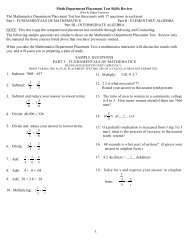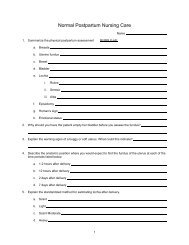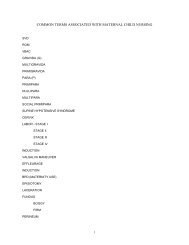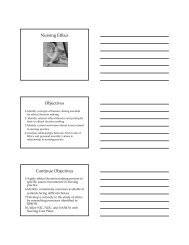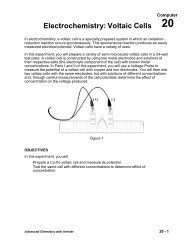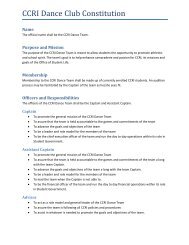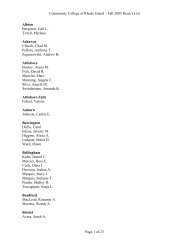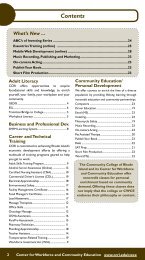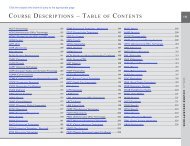Course Descriptions - Community College of Rhode Island
Course Descriptions - Community College of Rhode Island
Course Descriptions - Community College of Rhode Island
Create successful ePaper yourself
Turn your PDF publications into a flip-book with our unique Google optimized e-Paper software.
DHYG 1060 - Clinical Dental Hygiene<br />
II - 3 Credits<br />
This course continues application <strong>of</strong> the<br />
principles and skills learned in DHYG 1020<br />
and DHYG 1030 as well as new material<br />
learned in DHYG 1050, including patient<br />
education and management. (Prerequisite:<br />
DHYG 1030) Clinic: 8 hours<br />
DHYG 2010 - Pathology - 2 Credits<br />
This course is an examination <strong>of</strong> general<br />
and oral diseases. Content includes<br />
etiologic agents, tissue response to injury,<br />
immunopathology, neoplasia, cardiovascular<br />
disease, general diseases with oral manifestations<br />
and oral pathology. Consideration is<br />
given to specific conditions <strong>of</strong> importance<br />
to oral assessment and care. (Prerequisites:<br />
BIOL 1020, DHYG 1040) Lecture: 2 hours<br />
DHYG 2020- Dental Hygiene III -<br />
3 Credits<br />
This course continues to expand on the<br />
principles <strong>of</strong> dental hygiene practice. Topics<br />
include service to patients with special<br />
needs and nutrition, including nutritional<br />
counseling. (Prerequisites: DHYG 1050, 1060,<br />
Corequisite: DHYG 2030) Lecture: 3 hours<br />
DHYG 2030 - Clinical Dental Hygiene<br />
III - 4 Credits<br />
This course involves continued application<br />
<strong>of</strong> the principles and skills practiced in<br />
DHYG-1060 and includes the application<br />
<strong>of</strong> principles studied in DHYG-2030: Dental<br />
Hygiene III, including local anesthesia.<br />
(Prerequisites: BIOL 1020, 2210, DHYG 1050,<br />
1060, 2090, DENT 2010, 2020; Co-requisite<br />
DHYG 2030; 12th grade reading level) Clinical:<br />
12 hours<br />
DHYG 2040 - <strong>Community</strong> Dental<br />
Health I - 2 Credits<br />
This course introduces students to the<br />
principles <strong>of</strong> dental hygiene practice in<br />
the community setting. Content includes<br />
financing and delivery <strong>of</strong> care, cultural<br />
diversity, education <strong>of</strong> groups, program<br />
planning and evaluation and management<br />
<strong>of</strong> the evidence base for dental hygiene<br />
practice. (Prerequisites: PSYC 2010, DHYG<br />
1060) Lecture: 2 hours<br />
DHYG 2045 - <strong>Community</strong> Dental<br />
Health II - 1 Credit<br />
This course allows students to apply principles<br />
<strong>of</strong> dental hygiene practice through a<br />
supervised externship in a community dental<br />
health facility. (Prerequisites: DHYG 1010,<br />
2020 and 2030) Clinic: 3 hours<br />
DHYG 2050 - Periodontics - 3 Credits<br />
This course involves an intensive study <strong>of</strong><br />
the periodontium as it relates to dental<br />
hygiene practice. Content includes epidemiology<br />
and pathogens <strong>of</strong> periodontal<br />
disease, assessment <strong>of</strong> periodontal status,<br />
current therapeutic intervention and strategies<br />
for maintenance <strong>of</strong> the periodontal<br />
patient. (Prerequisites: BIOL 1020 and 2210)<br />
Lecture: 3 hours<br />
DHYG 2060 - Dental Hygiene IV -<br />
2 Credits<br />
This course continues to expand on principles<br />
<strong>of</strong> dental hygiene practice. Content<br />
includes legal and ethical issues, dental specialties<br />
and entering the pr<strong>of</strong>essional work<br />
force. (Prerequisites: DHYG 2020, 2030)<br />
Lecture: 2 hours<br />
DHYG 2070 - Clinical Dental Hygiene<br />
IV - 5 Credits<br />
This course allows students to continue to<br />
apply the principles and skills practiced in<br />
DHYG 2020, 2030 and 2060. Integration <strong>of</strong><br />
dental hygiene procedures into a complete<br />
dental hygiene service is covered. (Prerequisites:<br />
DHYG 2020 and 2030) Clinic: 15 hours<br />
DHYG 2090 - Pharmacology for the<br />
Dental Hygienist - 3 Credits<br />
This course is a study <strong>of</strong> the principles <strong>of</strong><br />
pharmacology as they relate to oral health<br />
care. Content includes indications and<br />
contraindications for use, pharmacological<br />
effects, adverse reactions and interaction<br />
<strong>of</strong> drugs. Special consideration is given to<br />
drugs commonly used in dentistry, as well<br />
as oral implications <strong>of</strong> drugs. (Prerequisites:<br />
BIOL 1020, DHYG 1020) Lecture: 3 hours<br />
DHYG 2200 - Local Anesthesia for the<br />
Registered Dental Hygienist - 2 Credits<br />
This course is designed to enable practicing<br />
dental hygienists to gain the knowledge and<br />
skill needed to earn a permit to administer<br />
local anesthesia in <strong>Rhode</strong> <strong>Island</strong>. Topics<br />
include oral anatomy, neurophysiology, the<br />
pharmacology and pharmacokinetics <strong>of</strong><br />
local anesthetic agents, legal issues related<br />
to local anesthesia and basic injection techniques.<br />
Students will serve as patients for<br />
each other. (Prerequisites: Active licensure as<br />
a dental hygienist in <strong>Rhode</strong> <strong>Island</strong> or another<br />
state with substantially similar licensure<br />
requirements, current CPR certification at the<br />
American Heart Association, Health Care Provider<br />
level; Completed Hepatitis B vaccination<br />
series) Lecture: 2 hours, Lab: 2 hours<br />
DmSD (DiAgnoSTiC<br />
meDiCAl SonogrAphy)<br />
DMSD 2100 - Patient Care for<br />
Sonography - 3 Credits<br />
This course is designed to develop the<br />
knowledge and skills necessary to address<br />
the needs <strong>of</strong> the patient in the diagnostic<br />
imaging department. The success <strong>of</strong> the<br />
students in the clinical setting requires the<br />
ability to conduct themselves in a pr<strong>of</strong>essional<br />
and ethical manner. The safety <strong>of</strong> the<br />
patient requires the student to have knowledge<br />
<strong>of</strong> the patient assessment, basic nursing<br />
skills and the ability to react to medical<br />
emergencies. Lecture: 3 hours<br />
DMSD 2210 - Sonographic Physics and<br />
Instrumentation - 4 Credits<br />
This course provides students with theoretical<br />
and practical aspects <strong>of</strong> ultrasound<br />
physics and instrumentation. Wave form,<br />
propagation, velocity, wave length, acoustic<br />
Prerequisite: Successful completion <strong>of</strong> course required before registering. Corequisite: <strong>Course</strong> must be taken prior to or at the same time.<br />
dhyg-dmsd<br />
impedance, reflection and rarefaction are<br />
discussed. Components <strong>of</strong> the ultrasound<br />
imager are examined as well as recording<br />
devices and basic doppler principles. (Prerequisite:<br />
MATH 1700 or equivalent) Lecture:<br />
3 hours, Lab: 2 hours<br />
DMSD 2220 - Sonographic Imaging -<br />
3 Credits<br />
This course provides students with general<br />
information that has application in all<br />
the ultrasonic imaging concentrations. It<br />
addresses standard protocols for patient<br />
care, as well as the management <strong>of</strong> data<br />
from other imaging modalities, laboratory<br />
findings and patient history. Pertinent legal<br />
principles are also covered. An overview<br />
<strong>of</strong> the categories in which disease occurs<br />
is included. The biological effects <strong>of</strong> ultrasound<br />
are discussed along with quality<br />
control procedures and their importance.<br />
Lecture: 3 hours<br />
DMSD 2230 - Abdominal Ultrasound -<br />
3 Credits<br />
This course provides a foundation <strong>of</strong> physiology,<br />
pathology and pathophysiology as it<br />
relates to the human abdomen specific to<br />
the performance <strong>of</strong> abdominal ultrasound.<br />
Students begin to recognize normal and<br />
abnormal imaging as it relates to anatomy,<br />
pathology and pathophysiology <strong>of</strong> the<br />
abdomen. Scanning techniques, protocols<br />
are discussed in normal and abnormal<br />
conditions. The development <strong>of</strong> the ability<br />
to perform abdominal examinations begins<br />
with classroom experience. Students use<br />
real-time ultrasound equipment with various<br />
transducers. (Prerequisite: DMSD 2100)<br />
Lecture: 3 hours<br />
DMSD 2235 - Ultrasound for Small<br />
Parts, Gynecology and Male Pelvis -<br />
3 Credits<br />
This course provides a foundation <strong>of</strong> physiology,<br />
pathology and pathophysiology as it<br />
relates to the male and female pelvis, thyroid,<br />
breast and scrotum. Students begin to<br />
161



